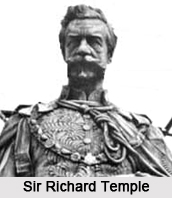 Bengal Presidency was an administrative subdivision of British India. The administration of this Presidency was looked after by several people holding varying positions. One such position was that of a Lieutenant Governor. Some of the Lieutenant Governors of Bengal Presidency are given below.
Bengal Presidency was an administrative subdivision of British India. The administration of this Presidency was looked after by several people holding varying positions. One such position was that of a Lieutenant Governor. Some of the Lieutenant Governors of Bengal Presidency are given below.
Frederick James Halliday
Frederick James Halliday is recorded in Indian history as a British civil servant and the first Lieutenant-Governor of Bengal. He was appointed as the Lieutenant-Governor around May 1854 and had left the office of lieutenant-governor in May 1859. As a lieutenant-governor, Halliday wanted to put to effect the anti-sati legislation, which was enacted soon after. Supporting the remarriage of Hindu widows, Halliday has an important role to play in enabling the Widow Remarriage Act.
John Peter Grant
John Peter Grant served as the Lieutenant-Governor of Bengal from 1859 to 1862.
George Campbell
George Campbell is recognized as a Scottish Liberal Party politician and Indian administrator. He had served Bengal as the Lieutenant-Governor from 1871 to 1874. During his governorship, the Pabna Disturbances took place. During the Pabna Peasant Uprisings, Campbell had guaranteed government support to peasants against excessive demands of the zamindars via a proclamation in 1873.
Sir Richard Temple, 1st Baronet
Sir Richard Temple is identified as a British politician and an administrator in British India. In 1874, Temple became the Lieutenant-Governor of Bengal Presidency. During the famine of 1874, Temple imported half a million tons of rice from Burma, so that the ones starving could get adequate relief. He was appointed as a plenipotentiary famine delegate to Madras during the famine of 1877.
Augustus Rivers Thompson
Augustus Rivers Thompson was the Chief Commissioner of the British Crown Colony of Burma from April 1875 to March 1878 and was the Lieutenant-Governor of Bengal between 1882 and 1887.
Charles Cecil Stevens
Charles Cecil Stevens served as the lieutenant governor of the Bengal Presidency from 1897 to 1898. He is known to have supervised the foundation of the Sidrapong Hydel Power Station, the first of its kind in Asia.
Andrew Henderson Leith Fraser
Andrew Henderson Leith Fraser was the Lieutenant Governor of Bengal between 1903 and 1908.
William Duke
William Duke was a part of the Indian Civil Service and served Bengal as its last Lieutenant-Governor. At that time, owing to the reversal of the 1905 Bengal Partition, Bengal was being re-organized. The capital of India was being relocated from Calcutta to New Delhi.
Other Lieutenant Governors of Bengal Presidency
Some of the other Lieutenant Governors of Bengal Presidency are Ashley Eden, Anthony MacDonnell, Alexander Mackenzie and Lancelot Hare.



















